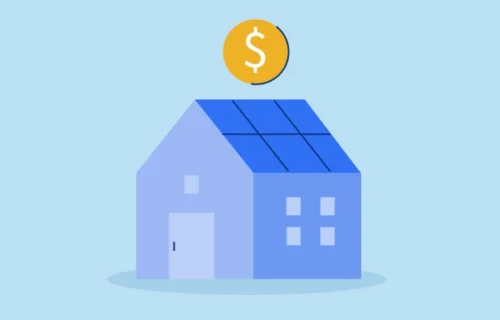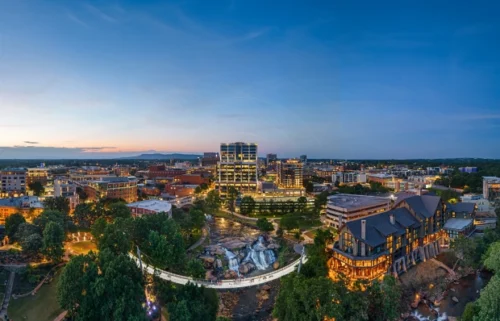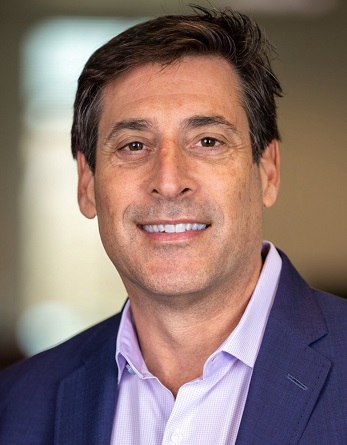
Connect with a Lima One expert today!
If you’d like to know more about this topic or see how it applies to your project, let’s talk.
Ep. 4 - Time to Scale: Moving from Fix and Flips to Multifamily
Dalton (Speaker 1)
I'm your host Dalton Elliot. Today we're going to be talking about making the jump from single family investing to multifamily property investing. I'm joined by one of the most well-known people in the real estate investment space. Cortney Newman's is a real estate investor, financier, social media star, Cortney, thank you for joining.
Cortney (Speaker 2)
Thank you for having me. Dalton, I really appreciate the time and the invitation to come on to the real estate of things.
Speaker 1
For sure, for sure. coordinate, I have traveled all over the country with you. I've known you probably a little over six years at this point. And it is absurd how big your social network is every city, Atlanta, Miami, New York, Vegas, Beverly Hills, la The list goes on. You knew everyone everywhere. The first question I have is how I can be like Cortney, what's the secret
Speaker 2
is not this is not a secret. I think when I first joined the industry, it came into what I have literally no clue about real estate. And I knew coming in with Lima one capital. So if background for bet, let's rewind to 2012. So um, I graduated University of Georgia in 2011. And I came on probably one of the worst times, because the job industry was not the best. And I had a marketing degree in econ degree. So I had no clue what I wanted to do. And I knew I want to get into real estate, but I didn't know myself well in I thought, Hey, I got a marketing degree, I get to go work for a fortune 500, Coca Cola, things didn't pan out that way. So my first, my first job out of college was doing versus merchant services for a company in Atlanta called playscape advisors. And I think that's how I really learned the value of selling and going door to door business sales. And that's probably how I got my chops and really learn the business and networking and really opportunity, really trying to fill that opportunity of really building your social network. And then my next job was business banking. I enjoyed that somewhat, because I got to learn to finance sides of finance side of the business. But it wasn't enjoyable to the point where it was a passion that hey, I love getting up every morning to do it. And so my star when we move one is I actually applied for a loan before I even thought about working for the company. I had that plug my mind, hey, I cannot sit behind a desk and do a nine to five every day. It just wasn't for me. It just wasn't in my nature. I want to get out and be overall people.
Speaker 1
That makes complete sense. And before I forget you, you went to UGA. You mentioned you played football there, right?
Speaker 2
Yeah, I don't know saying I played football. I was on the team when I was there.
Speaker 1
I that counts, that counts, I count. So that's a super interesting fact about you, man. So you fast forward, you get into the real estate space on the financing side, when did you do your first flip.
Speaker 2
So my first flip I actually started when we moved on in 2012. And then I did not take the jump to do my first flip until 2015. And I think the reason like I apply for the loan back in 2012. But I just never took that leap. Because I kind of just seen what my clients were doing, learn from their mistakes, seeing what errors they were investing in. And just pretty much took it all in. So went by the time I was able to do my first flip. I didn't want to make any mistakes. Fast forward. Even with my first book, even knowing what I've known for years in industry, I still make all the mistakes in the world. So I tell everybody, you just cannot just plan for a plan for what you see on a flip is always going to be surprises when it comes to doing a flip. But I would rather learn from the world of hard knocks than just sitting back and thinking I can get it from a book.
Speaker 1
Yeah, it's something about, you know, the classroom setting, right, you're on the you're working with clients in the more academic setting where you're seeing the mistakes made, but it's not really directly impacting you versus getting out there. And it's your money on the line. It's your tail on the line in a completely different story. And I'm really interested as we chat today to learn about how the stakes change whenever you move from single family to multifamily. So, you know, just recently it's late 2021. Now, you purchase your first multifamily property, right.
Speaker 2
Yeah, my first multifamily property was purchased made pandemic in May, in May of 2020. So what happened was, I wanted to flip so I flipped between five and 10 houses a year. And I always knew that, hey, I wanted to get into passive income and want to be a legacy where I can get up to let's say 500 to $1,000. That's always been My passion and where I wanted to get to, I knew I didn't want to flip. I never wanted to be the flipper, that's flipping 100 houses a year, I just seen the toll that it takes on people and the stress. And the, I will say staff that you have to have to maintain that type of business. And I've always seen the sweet spot of doing flips, it's like somewhere between that 20 to 50 range where you can handle it and you maybe can have one or two people on your staff. But hey, I work from we move on, that is a full-time job in itself. So I got my nine to five, and then I got my side hustle. But I love both because they're intertwined from day to day. And so purchasing a property. I started looking at that property in December of 2019. So I knew I wanted to get into multifamily. And I had no clue what I was doing. But I knew I had to take a leap of faith just like I did with a physical.
Speaker 1
Yeah, so what, take me back to whenever you have that decision point of Okay, I'm gonna finally chew off my first multifamily project. Looking back, what, what were the differences between all of the SFR deals you had done previously? All of the research before you get into property? How's that different from the multifamily side of the fence?
Speaker 2
So I will have to give all credit due to two guys. One is Brian coffin that's in the office. He is our multifamily girl. And then the second is Chad must grow. He works for lumen out of Miami, Florida. So literally, we met and Brian were charged of trying to develop our multifamily program. What was it four years ago? And I had no clue of multifamily. No clue how to underwrite it, no clue how to look at it. And I think what you have to look at on the multifamily side versus single family side is the value component is really looking at, hey, how do I create value on the multifamily side versus single family side, single family side is all the bells and whistles like stainless steel appliances, all this, the lighting, the open concept, all that today to create the value that you're going to home, more so on the multifamily side is, hey, you really have to look at your bottom line, because your income statements and everything there to reduce expenses. That's how you drive the value on that property on that side. And so for me, it's like I needed to look for a property where my strong suit was, Hey, I have construction people, I want to really add value to that property by bringing into construction, but also it has room to grow from increasing the rents and everything like that. So with the two lists of Brian and Chad and really understanding how to underwrite a multifamily, I didn't take the plunge into I knew I had a surefire deal that, hey, if everything goes wrong, as long as I add value to the construction, I can raise the rents and it's not so more so dependent on the financial with all of the property and just trying to reduce expenses on that side.
Speaker 1
Yeah, a big takeaway there, in my mind is no matter how big you get in this space, you always have to surround yourself with people who, you know, maybe not even know more than you. But they know more than you in a specific subset, right? Because multifamily is so different from the SFR side of the fence when, you know, you mentioned the product launch of multifamily a few years back, it was a completely different language, to me, the multifamily side of the fence versus SFR. And I still, admittedly have so much to learn there. It's just a completely different piece so that the relationship side is like,
Speaker 2
yeah, it's like, no one knew what No, I was, like, I literally had to sit down and say, Brian, like, explain to me how to calculate it was all for knowledge. And this is coming from someone that went to UGA. And we went and finance class in really weird accounting classes. But this is all foreign, foreign language to me.
Speaker 1
So buying your first multifamily a huge piece is find somebody who's done it before and talk to them, right.
Speaker 2
Yeah. Or surround yourself with very smart guys and make them do it.
Speaker 1
Yeah, as a sage advice. So you mentioned mistakes earlier, right? Those happen all the time. And so many unintended things, you can't anticipate every single thing in a transaction getting into a property, that the magnitude of that just has to go up higher and higher, the more units you have in a single project. So you know, you've had the property for a bit, what would you do differently? Or what would you know, what mistakes Do you look back kind of kick yourself in the tail for or mistakes that you're like, hey, this, this, this was just gonna happen. It was inevitable and we just have to put our shoulder down and forge ahead.
Speaker 2
Yeah, I think I put myself in a back against the wall. Because for my close buddies, they invested in the property with me. And so it's like, hey, it's not only my money at risk, is there money at risk? And so I took every leverage point of what I learned in single family as reserves, looking at Hey, was the worst-case scenario with this property, can we get out and sell it at a cost basis where we get all our money back. And so I think I learned that, hey, whatever was going to go wrong, something's always going to go wrong. And with this particular project, I purchased it for 1.45. And the renovation cost initially that I thought was going to be 250,000, end up being 375,000. But I plan for that I knew, hey, something is always going to go wrong, especially like you haven't on the single-family side. So I made sure I raised enough capital to support that and support me taking that long, two years all the way throughout, where we don't have to default, I don't have to go to the piggy bank and go into my retirement money or anything like that. Because I was just, I think, I think, and then the pandemic also made it where, Hey, I got to be a little bit more conservative. So raise more capital, if you're going to pay more money on the capital that you're gonna raise. But I would rather be secure in that, that I have their money available, and we're not scrambling trying to find that money later on down the line. So I think that was one thing that I know, hey, going into a project always raise more money than you need for that project, I would say probably 15% more than you need just the habit. And you're going to pay for that cost of capital, because it's equity. But it's better to do a dance better than trying to go back to your investors and raise the game. And then the second thing is, thoroughly, thoroughly, thoroughly. Question your property management company. I think what happened with the property management company, I didn't really know the ins and outs of the day to day are what they were supposed to be doing. And so really learning Hey, how, what is the staff is doing? What are their daily operations? What am I paying payroll for, and really learning those things, understanding those things when it comes to property management, because it's the key, that's the key driver to the multifamily business of raising the risk and doing it in a timely manner. And doing it fast, where you can turn over that money and get your money back to your infectious debt is all about speed. And it's all about those of increasing your ROI basis. So I think those are the things that I learned from really that first six months, it's like, I had no clue, like everything was hitting me at once. It's like, Hey, I'll work from level one from five in the morning to six. And then at night from like six to 11. I'm looking at the multifamily project, I'm looking at the expense reports, I'm looking what I'm doing here, and saying, hey, how can I get better? How can I make my operations better, I can make processes better, where everyone is communicating effectively, and they know what they need to do. the easy part for me coming from the face of fluid world was the construction management, that was the easy part. But learning the other components of the business, that is really where I had to cut my teeth.
Speaker 1
Interesting a lot a lot in there. So the reserve piece, that makes a lot of sense, right, it's better to pad it a little bit just to be safe and conservative, as opposed to putting yourself so tight and thin, where you're going to have to go back potentially to people or even in your own side to to earmark more money that you just didn't expect better to have it and not have to use it than have to go try to raise more. So that's really big piece. So interesting that construction management side of it, constructions construction, you know timbers, timber, nails or nails. It's just the number of units that's the only thing that's really different but the nitty gritty piece so it's really like all in the paperwork side of it right and projections and the property management side that that's a big one too in the multifamily space that I feel like it's a lot more cookie cutter on a granted you have you know, plenty of great property management and you have you have the opposite that's true in the SFR side, but I just feel like on the multifamily side of the fence property management I guess because it's always gonna be in place like you're not going to self-manage 500,000 units whenever you get to your ball or your field of dreams court a right so talk a little bit about the property management side and making the transition from SFR to multi what's different about it, what do you on the lookout for especially forward flow as you're looking to go from 32 units to 1000.
Speaker 2
So I think I've never wanted to be the person to hold single family rentals. And I've noticed against philosophy because I literally finance on just on a yearly basis. But my philosophy has always been flip, flip, flip, save that money and then put it to multifamily. The reason is I see that multifamily you just scale and is more so everything is one is in one spot. So this is my philosophy. I don't want to be able to and it may sound boozy, it may sound like off the wall but it's like I don't want to buy $150,000 house to cash flow $300 a month on it is like I got it down 20 $25,000 and I got a cash flow of $200 a month. It just doesn't make sense to me. And it never did and it I just cannot get with it. So that's why I say, hey, instead of me rushing, trying to get rentals on a single family space and do the bur method, Hey, I know what the bird method is, I put it on social media, hey, it's for people who feel that they want to do the bird method. And they get tax advantages for that, but it's just not for me, my model is flip, flip, flip, and they're saving money and important to them in multifamily projects. And so I finally got to the position where, hey, I had a substantial amount of money where I could go into a multifamily project. And it was just time to do that. And the reason I wanted to have a multifamily project is like, instead of me having 36, houses, scattered all over making in Atlanta, I would rather have 36 units all in one spot. And hey, I have one property manager there, I have one maintenance man there, and they could take care of all the needs. And so I feel like that is more for me a scalable business and buying multifamily product or buildings versus me trying to go get five 500 to 1000 rooms, covered over four or five states is just, I just can't deal with that headache. And then the thing is, when you look at single family, it's like, one AC unit can cause me to in one house and cause me to lose my whole year on single family. So when I look at something just as simple as that, I was like, for me, that's just not a good investment for me, just for me, I don't preach this if anyone else has to keep saying that. But for me, it just it just didn't feel right to feel good investment on my side. F.
Speaker 1
No, it makes complete sense. So. So geographically, you kind of mentioned is SFR scattered across five states or so. The just that scenario, if you have that many SF RS on the multifamily side, as you look ahead, you're going from 32 units on up. What does that look like? Are you envisioning kind of all in the end? I don't even know if I asked your property, your multifamily properties somewhere in the Atlanta area? Where is it?
Is in Macon, Georgia suppose from? Oh, my God. I love
Speaker 1
that's really cool. So do you think? Are you really just looking in Georgia, you think you're gonna end up whenever you hit your goal? All units are gonna be in Georgia? Do you think you're gonna be seeking opportunities outside or just always keep an open mind? What's the strategy there?
Speaker 2
I think like multifamily is such a competitive market right now, literally. And I just closed on a 72 unit and make it probably about two months ago. And it's just so competitive. And I think I have to look at secondary market outside of Atlanta, because I think data started from Lafayette communities. He said this, he said, who has access to the cheapest capital will win all the time. And so right now, I don't have access to the cheapest capital out there. I was still paying double digit press. So anybody want to come and invest in me, please let me know. I'm still paying. And right now, I haven't gotten to the single digit press, because I just don't have that experience, and just not able to scale up to get institutional capital back me. But I think me, I have to have an open mind to bind in other markets. And the thing is with multifamily is a rental repeat product. Literally, I have my flooring that I use, I have the same faucets, the same lighting, and I can rinse repeat the same pet color. And I may change the HTML code of the buildings to give it a more modern look. But it's literally rinse or repeat for every product that you put in. And just normal mark, you have to go in. And in some, in some cases, it's just really going into painting. And then you can raise the rents internally just over time. And some you're going to need a heavy lift. But it's it is so much easier than a single-family flip like this is not as much brain damage. And so but going back to your question started going off on a tangent. Going back to your question, I think I have to have an open mind and I think where I'm gonna be able to have my success is like, I'm gonna learn, I can find anything that I could afford, and that the money I could raise the baby to go that go that route because I'm competing with all the funds, all the all the institutional capital because they want all the product in making. So for me, I have to go to secondary And third, third, third markets were paid is going to take a heavier lift, but that's my expertise because I'm coming from the single family world to the to the multifamily world. I'm not afraid of the construction company. For those guys that have the access to cheaper capital. They're just going in and like we said earlier, pretty much looking at performing and looking at your analyze and your income statements and saying hey, what can I do on that side with my cheat capital to raise the rents and then raise the raised perform it where it looks better in a long term, get those deals that are looking for. So I think that is the difference for me where I rather do a heavier lift project. And those usually every live projects are on the outskirts and the secondary, tertiary markets.
Speaker 1
Yeah. And do you see kind of across the board, a little less competition there, because people are a little more put off by the thought of having to go in and do you know, even if it's not extensive work, but doing work across the majority of the units? You think that's a pretty big, call it scare off for most people,
Speaker 2
I think is a scare off for people that are not like, I think you're the institutional fund guy. I think that's the scare off of them, because they don't want to have the operations to be able to go somewhere like that and do it. So it's like, can you get the staff to be able to do that in Atlanta? Yes. But could you get the staff to do that, and somewhere like Macon, Georgia, or Tifton, Tifton, Georgia, it's kind of, it's gonna be gonna be hard to do that. So I think give is less competition, but it's still heavy competition, because the asset class of multifamily has really, really, it's proven out to be one of the best acts, safest asset class even coming throughout the pandemic. So people were chasing that yield and really want to put their money into that into that product. So even though I'm going outside of the norm, and looking at different states, and looking at those secondary markets, it's still a lot of competition out there.
Speaker 1
Is that competition going to slow down? Or do you think it's, it's really just kind of reared its head for the first time, and it's gonna keep on getting more and more competitive,
Speaker 2
actually, is going to get more and more competitive, because I think as we have inflation going on, and the home prices is no inventory for home prices, so people have to have a place to live. And so if you don't have the inventory and SFR side for rent, then if you see your rents are growing on the multifamily side, I think people are going to keep putting their money and so on. And so those assets, and it's going to continue to grow. So I think it's a catch 22. Because as far as probably affecting the world of multifamily almost.
Speaker 1
Yeah, that makes sense. You've done some new construction. do you envision that being part of your multifamily strategy? Do you think you're gonna get into double digit multifamily builds?
Speaker 2
That that is very scary, if some of them are thought of as something that I want to do? It's just that it's just a whole different world. And I have no clue of how to underwrite it, what to look at, what's my cost of Bill. So if I look at a project, it's gonna have to be something very, very small scale, I will think somewhere between 10 to 30 units, before we go try to do 100, unit, new multifamily bill. And the thing is, for me, just like our product, the basic linear one, we really love workforce housing, and provided housing for, for the for the, for the, our say, for the working class, I think that is my strategy on the multifamily side, hey, I want to be able to take a product that has been untouched for 10 1520 years, and bring it to today where the workforce to have a product where they are proud to come home to everyday. And it's not something that always needs fixing, and not something that that looks outdated, but it's something they're going to take prior for, and they maybe may pay a little bit more premium for that product. So always taking that approach. So that's, that's, I think that's where I want to be, because once you get into new building, you have no choice but to unless you're getting tax incentives, or getting tax credit deals, which I have no clue about, I know about them, but I have no clue of how to either raise the financing for that. But if you're doing that, you're more so looking at a class a product where you're going to have to demand the highest rates.
Speaker 1
It makes sense. Yeah. Now that I'm thinking about it, if you look at the interior of a unit SFR or have, you know, the inside of a unit in 100 door projects, it's going to look similar, right, from a rehab standpoint. But if you zoom out and you look at a single-family home versus 100-unit complex, like construction on that just has to be a completely different beast. That makes sense. What do you know, so you've knocked the dust off? You're now a big-time multifamily investor
not being found. Not.
Speaker 1
So you are you know, what, how have you changed your strategy, right from property number one, to now you're, you know, you have a good number of units under your belt. How's your strategy different across the board from scoping out properties, active management, how's it changed things that you maybe didn't do or did do the first go around that as you've kind of advanced in the multifamily world You've changed,
Speaker 2
I think, is really trying to have your operations. And then SLP is an order where, hey, I'm not having to spend as much time and day more labor intensive in the projects. And so really learning from that first project, I know, hey, this is how this this side is going to go. So I know how to plan out what needs to happen and what we need to do in units, hey, we may not have to do as much as this renovation to vapor to obtain a rent. So I think going in, I thought I had to, I just got to redo this whole unit, and then that's going to come in the spring. No, really understanding the walking the product as to Hey, this needs to be changed, this needs to be changed this estate, we can restart this, this, just really understanding how to cut this basis really helped out a lot. And then also being able to plan out and staff three to four months in advance really getting with a property management company say, hey, let's look at the rent roll. Who's coming up for renewal? Can we increase these? Can we increase the rents on this property without having to lift a finger on it? Can we go in and say, Hey, we're going to increase your you haven't been? You haven't had a real increase in two years. So we're going to increase it 75 to $100. And just really knowing Hey, how can I change the bottom line of their property without having to lift a finger? Or having to be bringing in labor to do that? And then what a little thing outside? What are you going to get the feedback from your residence? Hey, what do they like to change? I think that's something that not many people do is they don't want to hear back from the residents. So really similar question. They're out when you have renewals. Hey, what can we change at the property? What would you like to see? So those little things where you can have long term tenants, but they also can be someone that takes pride in your property and don't move for eight to 10 years. So that's, that's the goal. Just like on the single-family side, you don't also want to leave your property within a year because you have to turn it off. So if I don't have to turn over every year that customers face on the multifamily side. So just doing little face, and little tricks to be able to understand your tenant mindset, especially in today's market, like with what's going on with COVID and everything and the rent moratorium. It's just really having someone that's prideful and really wants to be a bit extra, extra complex for your project.
Speaker 1
Yeah, customer experience. I love it. Like everybody, everybody has options, right? And if you're not talking and listening, then you're not going to understand your client's needs. And at the end of the day, tenants are clients. So you got to make sure the product you're delivering matches up with the need there. What's your take Cortney on, you know, a lot of talk around homeownership versus renter nation. Where do you think that's going?
Speaker 2
So as always, me myself, I'm a millennial, where I'll be 32. This year, I'll be 32 Yeah, I'll be 32 this year. This is crazy. This is crazy to say, I've always wanted to, I guess build wealth THROUGH THROUGH THROUGH homeownership, a lot of my friends are just now getting to the point where they're, they're able to buy homes, and they're in in their careers where they're five, seven years in the careers and they have disposable income, and they want to start investing in homeownership. But I've been preaching it since I've been in the industry as like I came into the industry 10 years ago when I was 22. And so my goal always has been, hey, buy a house. And it kind of plays in the jumping ship thing is buy a house, and then stay in that house for two years, and then move on to the next. So that's always been my goal is like buy a house gang equity, tailor equity, and move on to the next style. So I've done it four times, I can't do it anymore. I have a family. I can't do it anymore. But I think it's the flexibility factor that we always have just going back to even with my job search for me being in a job and just like being flexible. And that's really up for now in in, in the time that we have going on. It's like, hey, I don't want to go into the office every day, hey, I want to be able to work from home, hey, I want to be able to I want to go to lunch, I could take an extended lunch and I can make it up on the backend. So I think that is really what plays into the renter nation is where they don't want to have that commitment of being in a home or being stuck there for 1520 years.
Speaker 1
Make sense? You kind of touched on some things that the pandemic really triggered a change of never too late.
That's what editing is for we good to go? It'll be good to go. See, trying to think of what we were just chatting about. Before we talked about renter versus renting recently, you're about to get into this now.
Speaker 1
Yeah, I got about I was gonna ask. pandemic changed any? Anything on the investing side for you? Okay. So all right. All right, Cortney. So, you know, we will not go down the COVID. Rabbit Hole. We'll just we'll just scratch the surface for a second. I have one question about it. How would that how has that changed your approach on the real estate investing side, this thing came out of nowhere in March of last year, us being on the financing side of the fence, you and I saw how quickly things changed. It was over the course of a couple of days that everything was fine on the lending side. And then capital markets just froze. So something that nobody really had a great plan for the last pandemic was 100 years ago. So we thought we were good and can handle anything but this this knocked everybody in the teeth. How has it change your habits, your investing strategy? What do you do differently now versus kind of pre COVID?
Speaker 2
I think pre COVID, I was very cautious there. And then post COVID. I'm kind of a little bit more, I would say personally aggressive, really, in the reason and that's on the SFR side. So I'm not gonna buy a property with a tenant. And I just, hey, we got to renew the moratorium, we understand, hey, you have to do what you got to do. I'm just not going down the rabbit hole. And I'll leave it at that. But I think because it's such low inventory, the economic meat going back to my economic back background, is it's simple economics. There's low inventory rates are at an all-time low. For me, it's like Hey, how you lose, and then also with the momentum that Airbnb has going on. So single family wise I invest in, like I can buy typically deals with one if I wanted to. I don't have the capital to do that. I don't have the desire to do that. But I see do good deals all the time. And I know hey, if this is a rehab that I can get in and out in four months, I want to do and if it can be in the first time homebuyer market, there's no inventory for this I can get out of this house and for me in Atlanta, if it's under 375 ARV, a homebuyer market is gone. I can I can renovate it, get it done. And I know I could sell that property without what I knew I could do to a renovation. So probably aggressive there. I don't like one of my rehabs because it's not as desirable as new construction. So I rather do new constructions, where I don't have to be as labor tested, where I'm not managing projects having to call up and do with the contract of Hey, I design it, give them a plan and you go off to your university, you're racist. The hardest thing is just getting the getting the permits for those projects right now and going through UDC because no one's working like it just closed down. And cinema has closed down like I have a love hate relationship with your with your local municipalities. But hey, it comes with a business if it was easy, every one of your mother would be doing it. So I think I'm more aggressive on the new construction side versus the rehab side but I think throwing up a house and being able to do that, but you cannot really build affordable housing, which that's, that's my passion, which I really want to do. So my new bills are probably somewhere between 450 to 700,000. And then you just really have to understand what that market desires and give them what they desire. But in pre selling those we have, we have had no problem doing that. So I'm more aggressive on that.
Speaker 1
Got it makes sense. Atlanta, talk to me about the Atlanta market. Right. I love Atlanta. Two and a half hours away from there. I love it every time I'm in town, it's growing. It's growing out a ton. Yeah, too. Right. So talk to me about just kind of the hot markets. You're in Atlanta area. So just talk to me about what you're seeing there.
Speaker 2
Yeah, so I so my pen name is give iPad. So I was like, man, I got to hit Ko. I got I got a recently born. So I don't know what's gonna happen. So I was like, let me go buy a house. And so me having to go buy a house, like me. Like it wasn't made me if anything, I would say probably April May like soon as that happened. I was like, go find a new construction house and buy in a good school district. I didn't put it on the contract. Fast forward a year later, I have $100,000 equity in it. So it's one of the best decisions I've made out of our penny. But waited, I probably would have never been able to find another house because you're going to compete with these people and be in the bidding war. So I really had to took that leap of faith. And so I think that that our particular houses in Decatur, so it's near downtown Decatur. And I think you have just a lot of trendy areas where Hey, everything is in the city. But I think people moving outside of the city. So I think you have to look at what your family wants and their needs. Because I've always had this philosophy by the school districts and by location. So if you can buy good school district, and by the location, you're always gonna win, because there's always going to be a demand for that product in those areas. And then so the hot areas that I see right now where people are moving to the caterer is still hot in town in any areas that that's close to the city center is still hot, because we have low inventory. And I think Atlanta is moving towards that Martin bill market. So I have like three or four martyr bills that are doing it has never resonated with me, but it has is grown on me lately with the Martin bills and really looking like what they've been doing in Los Angeles for the last five to seven years. It's now more so coming to our market because we have always been a traditional martyr farmhouse, your ranch style feels just more traditional here, but just seeing that you have transplants from different areas. And that's what they want. They want them more modern style house, I think that's becoming more of a norm here as well. And so places where you can do those infill new construction, the dual martinville is gonna sell and those are selling quickly. And then I was like outside of the city that people probably personal have not say, hey, I want to move there. But you have areas like College Park, East Point, and those ones that bother hapeville that about the airport, having that relatively to the airport where people can get in and travel and get to the airport within 10 minutes. I think that is that has been something that has been good as well. And then the suburbs have just always been on fire. Like I said, you go next, your Cobb County where you have a school district. So I think that's a breakdown of the Atlanta market
Speaker 1
itself. That's great. I was talking with a real estate investor in Atlanta when I was down there a few weeks ago. And he said that, you know, so many real estate markets are on fire, right? Just nationwide. One of the, you know, call it gasoline on the fire parts in the Atlanta area is that you're seeing a big influx of people from out of state moving into Atlanta moving into the South don't have to worry about the crazy winter weather and other places. Cost of living way better than if you're in LA right. So see a northeast and West Coast folks kind of ditching that live and moving to the south and Atlanta is a major hub if not the major hub in the southeast. Are you seeing that too? Do you think that's having a big effect on pushing prices up? as well?
Speaker 2
Yeah, I think that causes price you got to think if you have a not trying to be funny, you have a $400,000 house here in Atlanta. That's almost like a mansion. You go put that same $4,000 house in LA is a piece of crap. Just meet me to one that's probably not that needs to be torn down. So when someone comes from New York or Atlanta, you say hey, I have this brand new home. That's 2800 square feet, bells and whistles in there. Open Costco, that is like, just a shot in the bucket for those like, hey, I want their product because you can't even get that square footage of space, and you're in it that's affordable to them. Because that same product, a $700 house is probably like a $2.2 million house, they're in New York or, or LA. So that's, I think that's the difference. Because the mindset is where someone has always been in this market. And they feel, hey, oh, my God, I'm getting priced out of the market. And this house is just too expensive. But you got to think about the affordability factor that same $700,000 house with a 2.5 interest rate, you can afford that same hospital 4.5 inches, right? So you really have to look at those factors and really understand what you can buy and what you're in, and how much you can get for the dollars you can buy with low interest rate market we have right now.
Speaker 1
Yeah, you brought up interest rates, so I'm gonna, I'm gonna force you to prognosticate on this. So. So we're trying to stay away from it.
Speaker 1
That's true. That's true. It's gonna be interesting to watch because that has played a huge part. Right? And it's been it's been weird. Definitely weird. But money has been has not been this cheap in a long time for this long. Maybe not ever like this. The inevitably, whether it's 612 1824 months, sometime rates are gonna take back up and normalize away from historic lows. Do you think that's going to curb competition that all or just ever so slightly? Or do you think it's going to you know, speak specifically to Atlanta, the market, you probably know the best? Do you think it's just gonna continue to be blazing fire?
Speaker 2
I think. So this is my mind set of things. So I think the, the fan would probably not raise interest rates 200 basis points, because that would just create this wildfire, panic and grid.
Speaker 2
So I would think they will creep up. But it's still, since we're at a historically low is not going to fit that many people. And then as inflation rises, that means your job, your job, jobs, and what's your demand is for as far as salary is going to increase as well. So I do see upkeep and uptake of Hey, this, I think next spring and summer is still going to be like blazing hot. I think you see a slowdown right now. But right now, because buyers are just tired. They're just they're like, Hey, I'm foregoing my, my expansion period, I'm putting $30,000 in earnest money, and I still can't win this property. So you have buyers that are probably like, Okay, I get it, I don't want to be in the market anymore. So that's when you see that slowdown. But as the kids go back to school, August, August has always been a slow month. So they're like, I see people posting on Instagram, told you guys, the market is gonna slow down. It's people on vacation people want to school, so I was like, okay, whatever you want to say whatever your philosophy is, is fine. But I think you as you get into next year, spring and summer, people gonna be like, okay, I want to find out how the rates are probably going to go up after this summer, because that's just what economics and the fundamentals are gonna say, hopefully, this this delta, where it doesn't keep doubling and going where it needs to go. So I think all that's gonna play in, it's gonna be a while just like a wild time of like, really be certain what's your business plan in Me, personally, I feel all my self inventory, I want to have it done by next summer, and then just sit back and see what's going to happen. As far as moratorium, I tell people, hey, you have to advertise, you have to go through the foreclosure processes, the mortgage companies do not want to have to have a lot of foreclosures, so they're going to try to do whatever workouts they can try to do. So that's going to be a six-to-nine-month process. So any inventory that you think that people are behind, you're not going to see them until after spring or summer of next year. So that's not going to affect the market where you're going to just see 1000s of inventory coming to the market. And right, and Oreos or foreclosures is not going to happen. Because before they even happens, people going to buy MPL or they're going to buy the inventory from the courthouse steps. So the normal person like you and me will never see the inventory. So just like what was like 2019 2018 all this quote unquote, Shadow inventory that's out there. we ever get that shadow inventory. So no. So that's just my philosophy is like, Hey, I'm gonna go balls to the wall. I'm single family. And in that summer, sit back and see what happens. I also hate locking in long term debt at this historically low rate on my multifamily projects, getting those stabilized and then just riding it out to the till we see what happens in the near future. So I think this time next year, we'll have a better preview of what the housing market is going to be.
Speaker 1
I think you hit the nail on the head there's just so much upside so much to go before it starts to get a little weird, right? What rate wise? And that was a tough one. So yeah, I think there's so much runway everybody's gonna be in good shape for a while. I'm gonna I'm gonna ask you to kind of boil down all of that knowledge into one nugget. So you know, you're a mentor to many. follow you on Instagram. It's at Real Estate by Cortney. Right. Cortney know, you make sure people know that.
Speaker 1
You see o r t and e y at Real Estate backcourt. A follow the man you put out great content by the way, I add Instagram, of course prioritizes. I guess what you spend time stopping on two seconds versus one second. So I guess I stopped a lot on your stuff because they feed it to me all the time. Always, always great insights and actionable advice there. Oh, man. But if you know if you could if I asked you for one piece of golden advice on real estate investing tangent to multifamily properties, what would it be?
Speaker 2
I would say people cautious. And the reason I say people cost is like, right now you have that sense of urgency where you have to do something with your money, because you're sitting on so much money. But be very cautious of where you place your money and interview. If you're going to place it with someone to be able to earn double digit returns or earn money up to be able to get passive income on your money. Ask them where they're investing their money. So I would say always just be cautious and be very careful and just be I would say mindful of, hey, this isn't an investment. It is an investment if you could take a risk and losing money but try to make trying to alleviate the risk factor of going into those investments. So I would say just slow down. People cautious. Don't be so eager and then just go into investment where you feel safe, and you are visiting with someone that you think is a good counterparty and they actually know what you're doing. That would be my advice.
Speaker 1
I love it. Mr. Cortney Newman's It is always a pleasure. I always learned Tom whenever I'm around used to thanks for schooling me on the multifamily side of the fence. I really appreciate
Speaker 2
it when I did, I think you could find some more better caliber people that can talk at a very high level to me, but we'll bring those people on the show next time.
Speaker 1
And always humble that's the big thing too. You're just a great dude. Follow Cortney at Real Estate by Cortney – C-O-R-T-N-E-Y. Thanks so much. This has been an episode of The Real Estate of things expert insights and analysis or real estate investing. Thanks so much for joining. Thank you.
*Transcript automatically generated from interview.
Subscribe for More Insights
Get the latest industry news & Lima One updates.









